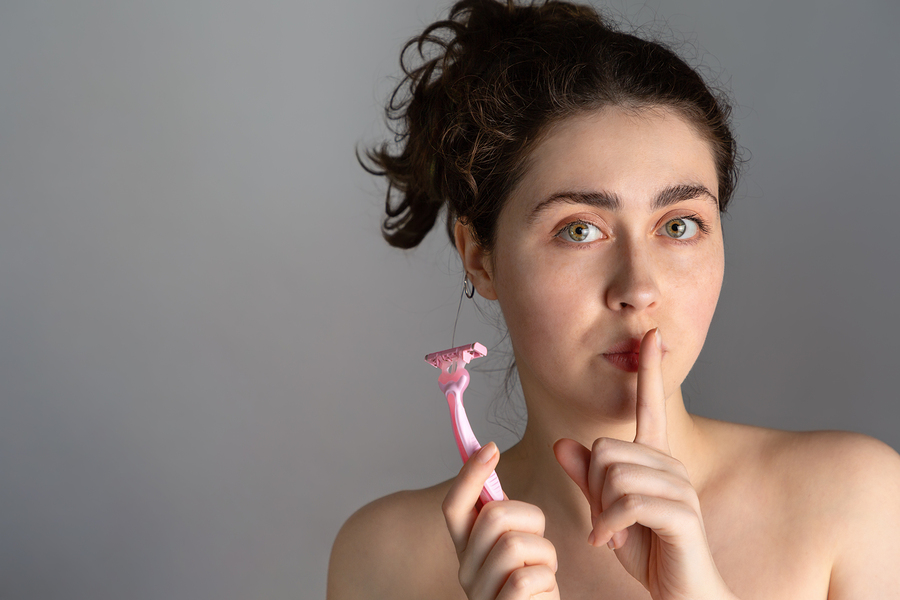HIRSUTISM (Male-Pattern Hair Growth in Women)

In my daily practice, I meet women who are looking for a solution to excess hair growth (hirsutism) in areas they feel it does not belong.
As a woman it can be very annoying to find that hair is growing in unusual places on their body. It is usual for men to have hair on their chin, upper lip, chest, stomach or back. If a woman gets these darker, coarse hairs in the same places as a man does it is usually because of a condition called hirsutism. Sometimes, hirsutism can occur with no identifiable cause. This happens more frequently in certain populations, such as women of Mediterranean, Middle Eastern and South Asian ancestry.
Causes
It is often caused by genes, hormones or medication:
Genes – Many things are passed down in families, both good and bad. If your mother or sisters have hirsutism, then it is likely you will get it too.
Hormones – Men and women may be different, but they have the same type of hormones in their bodies. However, the ratios of said hormones differ from men, compared to women.
Women will have certain levels of male hormones in their system (known as androgens.) It is usual for their bodies to produce these hormones. They are at a very low level and don’t cause any excessive hair growth. However, when the levels of these male hormones become too high, they can cause hirsutism, a deep voice, acne and small breasts.
Women who have high levels of male hormones and hirsutism commonly have:
- Polycystic Ovary Syndrome (PCOS), which causes multiple cysts to form on your ovaries.
- Cushing’s Syndrome which is caused by high levels of cortisol (known as the stress hormone over a long period of time.
- Tumors in your adrenal glands (which make hormones like cortisol) or your ovaries.
Complications
Hirsutism can be emotionally distressing. Some women feel self-conscious about having unwanted body hair. Some develop depression. Also, although hirsutism does not cause physical complications, the underlying cause of a hormonal imbalance can.
Medications that Cause Hirsutism
Some drugs can affect the level of hormones in your system, so unwanted hair can grow on your face or body. This can occur with:
- Drugs that have hormones, such as anabolic steroids, systemic corticosteroids and fluoxetine (Prozac) for depression.
- Drugs that spur hair growth, like Rogaine (minoxidil)
- A drug known as Danocrine (danazol) that can help with endometriosis, when the tissue that lines the uterus grows outside the womb.
Treatments
If you have more facial or body hair than you want, there are a number of ways to remove it.
Weight Loss – Your body makes more male hormones if you are overweight. If you lose weight, the level of male hormones produced by your body should decrease so less hair should grow on your face or body.
Waxing – It is a quick way to remove a lot of unwanted hair by the root with melted wax. Usually done in a salon, wax is applied to the skin, then removed quickly. It can cause pain and redness.
Shaving – Using a razor or an electric shaver is quick and easy, but you may need to do it everyday to prevent stubble growth. Razor burn can occur from shaving too often, but a soothing cream can help.
Tweezing or Threading – Both methods are used to pluck hair out at the root. You can use tweezers. Or you can hire someone to “thread” – using a long tight strand to loop around and remove each unwanted hair. Both methods can also cause pain and redness.
Creams – Some creams have strong chemicals called depilatories. You apply the cream, let it sit for a while, and when you wipe it off, the hair goes with it. They can irritate sensitive skin, so test a small spot before you use one on a large area.
Electrolysis – You can remove hair for good with electrolysis, a service that treats the hair at the root with an electrical current. After you repeat the process several times, hair should stop growing in treated areas.
Laser Hair Removal – The laser emits gentle pulses of energy that passes through the skin to the hair follicle. This energy is then absorbed into the hair follicle to destroy it, so the hair will never grow there again. You will need to repeat the process several times.
Medication – Doctors can prescribe drugs that change the way your body grows hair. When you stop using the medication, hair will grow back, though.
- Birth control pills make the body produce fewer male hormones. With regular use, you should have less hair on your face or body.
- Anti-androgen blockers help your body make and use fewer male hormones, so you should grow less hair over time.
- Vaniqa (eflornithine) is a face cream that slows hair growth where you apply it.
Freedom from Unwanted Hair
If you are dealing with excess hair growth on the face and body, which may be due to hirsutism, you don’t have to live with it. There are options to permanently rid yourself of unwanted hair. We offer electrolysis and laser hair removal in our office to do just that. We would be happy to explain and take you through the steps to being hair free and remaining hair free.
Give us a call or e-mail us so we can put you on the road to getting rid of your unwanted hair for good.
Phone: 604-792-5272
Email: info@electrolysisbyshelly.com
